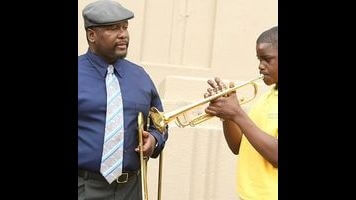Treme dies as it lived

The rap against Treme has always been that it’s more concerned with authenticity than it is telling a story. The characters lecture others—and, by extension, the audience—about the true meaning of New Orleans or jazz, and that’s essentially the sum of the show’s conflict. Hailing from David Simon, creator of The Wire, this has always stuck in lots of critics and viewers’ craws. Shouldn’t there be more happening? Shouldn’t the show be bigger, or have more of an epic sweep?
Yet, those looking for a slow-building march toward some sort of catharsis from Treme—those looking for it to be The Wire in New Orleans, in other words—have always been barking up the wrong tree. Headed into its fourth and final season, Treme has never quite washed its not-Wire status off. This is too bad, because at its best, Treme is one of TV’s most vibrant and vital shows. It’s a series less about telling stories, or having grand character arcs than it is about capturing the act of living with a focus on the way recovery, of cities and broken individuals, is undertaken one week, one day, one step at a time. The show’s beauty is not in big moments, or exquisitely written scenes (though it has both), it comes in the pauses between, the semicolons and commas that make up the bulk of many lives, but which TV has trouble giving full heft.
If there’s a complaint to be leveled against this final season, it’s that it doesn’t feel like a final season at all. (Indeed, the series finale ends in the middle of several prospective character arcs.) After squinting hard enough, it’s possible to see how the season builds toward points of closure for all of the major characters, and there’s an all-consuming illness that fells one important figure before the season is out. But there are few grand epiphanies, or moments of transformation here. There’s simply the sense of people who have come a long way from when the series began, yet haven’t realized how far their journey would take them. In the musical montage that finishes the series, there are no closing parentheses placed on any of these lives. Rather, a sense that the characters are still in the process of realizing what their own endpoint might look like in the years they have left is provided.
There is no other way to end this series. There are arcs here, of sorts, particularly from Steve Zahn’s DJ, slowly moving toward respectability, and Clarke Peters’ proud old man of the city, slowly realizing his own limitations. But the overall feel is that of the world rolling by as implacably as the Mississippi River glimpsed here and there throughout the season. People die, and other people mature. Businesses are started, and new careers are born from the ashes of ones that self-immolated. Crimes are solved, and others are covered up. A new president is elected, and the local football team marches to victory. People tell the truth. Others lie. The river rolls.
 Keep scrolling for more great stories.
Keep scrolling for more great stories.
